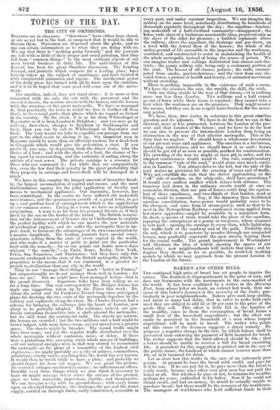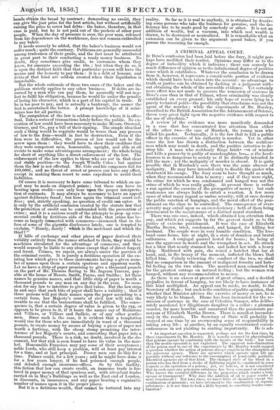BAKER'S AND OTHER BILLS.
THE continued high price of bread has set people to inquire the causes. The dearness is disproportionate to the price of corn, and does not harmonize with the movements in the corn-market of the world. It has been explained by a writer in the Morning Post, from whose letter we made an extract last week, that one cause of this baker's dearness is the necessity of the trade, par- ticularly in poor neighbourhoods. Bakers give such long credits, and incur so many bad debts, that in order to make both ends meet they are obliged to add 25 or 30 per cent to the price of the goods they sell. This effect is little felt in the families of the wealthy, since in them the consumption of bread forms a small item of the household expenditure ; but the effect can easily be perceived in the household of a man whose largest expenditure will be made in bread. The writer who points out this cause of the dearness suggests a direct remedy. He proposes a negative change in the law, by which bakers shall be prevented from enforcing the payment of debt incurred for bread. The writer suggests that the limit allowed should be 10s. ; that a baker should be unable to recover a bill for bread exceeding 10s. A precedent for this suggestion is pointed out in the case of the public-house, the landlord of which cannot recover more than 10s. of debt incurred for drink.
Let us show how this works in the case of an extremely poor person. At present he buys the bread with credit, and pays for it if he can. If he can pay for it, he pays more than the bread is really worth, because some other very poor man has not paid the baker at all. But whether he pays or not, he remains for months, perhaps for years, enthralled to his baker. Now if he could not obtain credit, and had no money, he would be actually unable to purchase bread; but there would be the resource of the workhouse. The managers of workhouses who hold sufficient funds in their hands ob the bread by contract; demanding no credit, they
can give e just price for the best article, but without arfifleially raising the price to cover bad debts : the baker, therefore, in that case is paid, but he is not paid out of the pockets of other poor people. le When the day of pressure is over, the poor man, released from his dependence on the workhouse, does not remain enthralled to any baker.
It needs scarcely be added, that the baker's business would not suffer much ; quite the contrary. Publicans are generally successful among tradesmen of their grade, and the fact must be attributed in great part to their conducting a ready money business. No doubt, they sometimes give credit, to customers whom they know, for amounts exceeding the 10s. ; but when they do so, it is upon the distinct faith that that particular person will have the means and the honesty to pay them : it is a debt of honour, and debts of that kind are seldom created when their liquidation is improbable. But the whole rationale of these two eases of the baker and the publican strictly applies to any other business. If debts are in- curred by a man who can pay them, he assuredly will not neg- lect to ftilfil his obligation, because he would lie under the penalty of losing his character, which is a part of his capital in trade. If he is too poor to pay, and is actually a bankrupt, the sooner the fact is ascertained the better. A prompt knowledge of it mini- mizes loss for all parties.
The compulsion of the law is seldom requisite where it is effec- tual. Take a series,of transactions lately before the public. No ex- ecution of law could have been necessary. to make Messrs. Overend, Gurney, and Co., pay a bill of their signing. The simple idea that such a thing would be requisite would be worse than any process of law to the firm—would in fact be destruction. Even if the firm were in difficulties, the process of law would not be the screw upon them : they would have to show their creditors that they were competent men, honourable, upright, and able at all events to make some advantageous arrangement ; the whole being far short of anything like a direct enforcement of the law. The enforcement of the law applies to those who are not in that clear and stable position—to the Joseph. Windle Coles ; but against them the law is not effectual. Mr. Cole and his congeners fail for 100,0001., and no threat of arrest or process can have any effect, except in making them resort to some expedient to avoid their liabilities.
Of course it is necessary to have some tribunal to which an ap- peal may be made on disputed points ; but these can have no bearing upon credit—can only bear upon the proper interpreta- tion of contracts. It may always be necessary to have an appeal against deliberate fraud ; but here again the criminal court suf- fices; and, strictly speaking, no question of credit can enter. It is only by the artificial confusion created by the statute law that the protection of credit can be confounded with the prevention of crime ; and it is a curious result of the attempts to prop up com- mercial credit by fictitious aids of the kind, that crime has be- come so largely connected with commerce—insomuch that in the face of some of the gigantic disclosures lately, one is tempted to exclaim, " Handy, dandy whisk is the merchant and which the thief ? "
If bills of exchange and other pieces of paper derived their validity entirely from the names attached to them, they would be machines circulated for the advantage of commerce, and they would scarcely be liable to any abuse except that of direct forgery and fraud. Crimes, we repeat, are always under the purvieu of the criminal courts. It is purely a fictitious operation of the ex- isting law which gives to those instruments having a given num- ber of names upon them a certain spurious and apparent worth. Let us have a strip of paper promising to give a thousand pounds on the part of Mr. Thomas Baring to Mr. Ingram Travers, pay- able at the house of Messrs. Smith, Payne, and. Smiths ; let these names be genuine names, and that little ;trip of paper is worth a thousand pounds to any man on any day in the year. No occa- sion for any law to interfere to give that value. But the law steps in and says that such bits of paper shall have a validity; that if three persons will put their names upon the paper according to a certain form, her Majesty's courts of civil law will take the trouble to see that the transactions shall be fulfilled. The conse- quence is, that a certain degree of value is given to the rag, or appears to be given to it, if it bears the names say of Maidstone and Villiers, or Villiers and Sadleir, or of any other gentle- men. Since such is the case, it is evident that a temptation would rise for those who are immediately in want of a thousand pounds, to create money by means of buying a piece of paper not worth a farthing, with the cheap stamp promising the inter- ference of her Majesty's courts, and converting that paper into a thousand pounds. There is a risk, no doubt, involved in the do- cument, but that risk is soon found to have its value in the mar- ket. Honourable Francises may pay some of their acceptances ; noble Lords, who still keep a position, will at least pay interest for a time, and at last principal. Poorer men can do this for a time. Palmer could, for a few years ; and he might have done it for a few years longer, if he had poisoned enough people, and deluded enough insurance-offices. So by this facility, this fiction that law can create credit, an immense trade is fos- tered in paper money of that spurious sort, with attendant trades earned on in May's Buildings as well as the East end of London, in discounts, in insurances, and any paper bearing a cognizable number of names upon it in the proper places.
But it is a fictitious wealth, that cannot be tortured into any reality. So fax as it is real to anybody, it is obtained by deceiv- ing some persons who take the business for genuine, and the de- ficiency has to be made good by somebody or other. It is not an addition of wealth, but a vacuum, into which real wealth is drawn, to be destroyed or neutralized. It is remarkable what an extension can be given to the argument quoad baker, if you pursue the reasoning far enough.



























 Previous page
Previous page